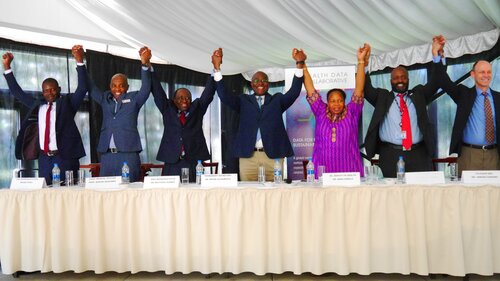Global health leaders and stakeholders gathered in Berlin last...
5 October 2017
Health Data Collaborative: working for one strong national system that meets all country and international data needs

The Health Data Collaborative (HDC) was launched in March 2016 to address the challenge of disparate funding and fragmented sources of health data in countries.
The HDC is a 'Related Initiative' of UHC2030. It is a joint effort by countries, development partners, civil society and academia to support country-led improvements to information and accountability systems, including the quality of health data, in order to improve performance of the health sector and achieve universal health coverage.
Recent work in Tanzania and Kenya highlights the importance of improving the quality of health data for evidence-based decision making, strengthening capacity to track progress towards the health related SDGs and coordinated and collaborative efforts of all stakeholders to unleash the full potential of health information systems.
Tanzania launches the Health Data Collaborative
The launch of the Tanzania HDC has established ‘One Monitoring and Evaluation Framework for the Health Sector of the Government of Tanzania’. The event took place on 11-12 September 2017 in Dar esSalaam, and was attended by 145 participants across the Ministry of Health, the President’s Office Regional Administration and Local Government (PORALG), and partners including Kenya Ministry of Health, World Bank/GFF, CDC, USAID, BMGF, GIZ, Data for Health, DFID, WHO, UNICEF, UNAIDs, and PATH.
Permanent Secretary Dr. Mpoki Ulisubisya of the Ministry of Health spoke at the launch event: “The Tanzania Health Data Collaborative will accelerate a series of joint priority actions to address gaps in our data and health information systems. I want to believe that through our collaborative effort, we will have one platform that will allow us to collect all the information we need, be it information on what we do for HIV/AIDS interventions, for tuberculosis, for malaria, for reproductive and child health, for maternal health, you name it.”
The meeting agenda focused on identifying country M&E priorities and aligning partners’ support behind these priorities, articulated in a communiqué issued during the meeting. It includes the recognition that a strong M&E system and regular measurement of results is essential for realising Universal Health Coverage.
Next steps include:
1) The Ministry of Health will determine the optimal coordinating mechanism to take forward the agreed six national M&E priorities
2) A mapping of partners’ current investments in health information systems will be completed to support the development of a national Common Investment Framework.
The conference also adopted a resolution to review progress on implementing the priority actions and to monitor stakeholders’ commitments annually (during the Joint Annual Health Sector Review). All relevant documents can be viewed here.
Kenya: HDC Partners Collaborate on National Health Observatory
Kenya’s Ministry of Health is developing a Kenya Health Observatory (KHO) to improve the availability and use of health information. The observatory is planned to be an open-access one-stop-shop for data and statistics, including research data, and will facilitate active tracking of the state and determinants of health in the country. This is one of the six priorities identified by the Ministry of Health when it launched the Kenya Health Data Collaborative in May 2016.
Key findings from the midterm review of the Kenya Health Sector Strategic Plan 2014-2018 provide the basis for the initial development of the observatory.A workshop was held on 10 June 2017 with 20 participants from Ministry of Health, University of Nairobi, The Kenya Medical Research Institute (KEMRI), World Bank, UNICEF, CDC, Intellisoft, African Institute for Development Policy (AFIDEP), and the WHO Country Office to advance the design and installation work.
Many partners have committed to contribute health information products for the observatory, demonstrating alignment and buy-in toward the initiative. For example, UNICEF has committed to provide its Nutrition Dashboard and KEMRI has agreed to share its research work on the observatory. Read more about the development of the KHO here.
“Kenya has made much progress towards establishing the health observatory,” said Dr. Isabella Maina, head of the Health Sector Monitoring & Evaluation Unit of the Ministry of Health. “There is very good alignment and strong buy-in from the government and partners including public health and research institutions.”
Further updates are available on the HDC website.
